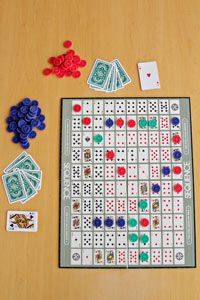Making Sequences
The idea behind Sequence isn't a new one, at least for many game enthusiasts in the southeastern United States. For years, a similar game known as One-Eyed Jack or Jack Foolery has been taking place on kitchen tables and living room floors. The only difference between these games and Sequence is that the board is homemade: A deck of cards is cut in half, and the halves are glued to a board (or simply dealt out on a flat surface) with the Jokers in the corners. Two fresh decks of cards and a set of poker chips are used for play [source: McCloud].
Whichever version you opt to play, the game can be used to illustrate basic mathematical principles. This can be especially useful for younger players, who can hone -- as the game's name suggests -- number sequencing and pattern recognition skills. For example, by considering which move to make next, as well as which move will help create a potential sequence, they'll practice visualizing and mentally manipulating spatial patterns.
Advertisement
One of the most valuable lessons, however, may come in the form of strategy. With every turn, players must decide whether they will add another chip to a potential sequence, block an opponent's potential sequence or start a new attempt at a sequence. And they must make each move without knowing whether they'll draw the card they need most, which adds an element of luck and suspense to the game.
According to Reuter, who invented the branded Sequence game now marketed by Jax Ltd., the most important strategy to follow is to start the game on the offensive by attempting to make a sequence and to continue this strategy through the middle of the game, switching only to defensive mode to block other players' sequences as the game nears its end. He also encourages players to watch for diagonal sequences, which can be harder to see when you're learning how to play the game [source: Reuter].
Sequence Game FAQ
What age is the game Sequence for?
Is Sequence a game of luck?
What does the joker card mean in Sequence?
How do you win the game Sequence?
Is there an online version of Sequence?
Author's Note: How Sequence Works
Although I'd never before played Sequence when I received this assignment, I was looking forward to it. I'm always up for a new board game and something about this one triggered a thought. Lo and behold, when I searched through my game cabinet I found a still-in-the-wrapper Sequence game. It was the first turn of good fortune in a game that requires a bit of luck.
After playing the game a half a dozen times, I have to admit I wished I'd cracked open the box sooner (three years ago when I received it would have been ideal). The game was fun, and I could already see there were strategies to employ, which left me intrigued.
Related Articles
Sources
- Board Game Geek. "Sequence." (Feb. 28, 2012) http://www.boardgamegeek.com/boardgame/2375/sequence
- Education World. "Box Cars and One-Eyed Jacks Math Game Archive." (Feb. 28, 2012) http://www.educationworld.com/a_lesson/archives/boxcars.shtml
- Jax Ltd. "Sequence." (Feb. 28, 2012) http://www.jaxgames.com/seq2.htm
- Jax Ltd. "Welcome to the Home of the Fun and Games People." (Feb. 28, 2012) http://www.jaxgames.com/
- McCloud, John. "One-eyed Jack." (Feb. 28, 2012) http://www.pagat.com/misc/jack.html
- Owatonna Chamber of Commerce and Tourism. "Welcome to Owatonna." (Feb. 28, 2012) http://www.visitowatonna.org/places-to-visit/oh-wah-tah-na.php
- Reuter, Doug. "Tips and Techniques." Play Sequence. (Feb. 28, 2012) http://www.playsequence.com/tips.html
- Reuter v. Jax Ltd. Inc. "Memorandum Opinion and Order." United States District Court, District of Minnesota. March 29, 2011. (Feb. 28, 2012) http://courtops.org/wp-content/uploads/2011/04/preliminjnxn_10113594254.pdf
- Stark, Steve. "Anecdote." InventorSpot Forum. Aug. 25, 2008. (March 7, 2012) http://inventorspotforum.com/viewtopic.php?t=2092
